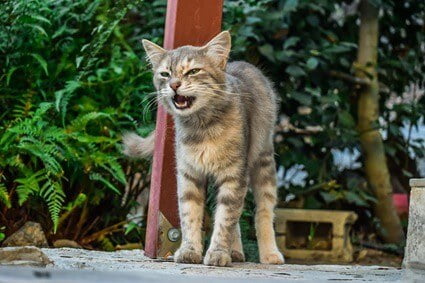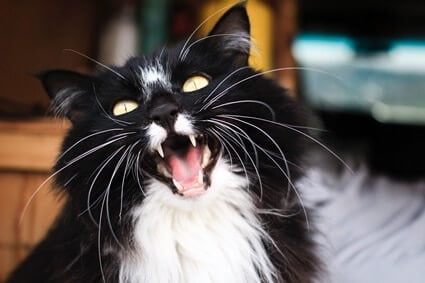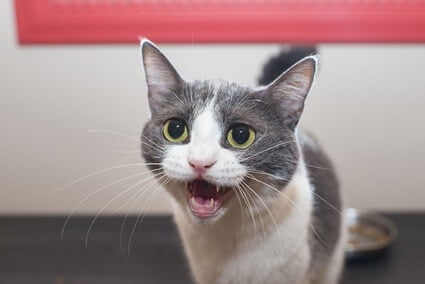A meow is one of the most common and instantly recognizable features of a cat. Understanding the sound and tone of your cat’s meow can alert you to several things. There are times when you might notice your cat’s meow changes quite quickly and suddenly. If so, you might wonder why it has caused this alteration to your cat’s voice.
Laryngitis, an inflammation of the larynx, is one of the most common causes of a cat’s changing meow. But many factors can cause a cat’s voice to sound different. This includes cat flu, damage to the vocal cords, excessive meowing, and injury or pain. Cats can develop sore throats, which can cause a cat to gag and swallow hard, affecting its meow. A cat will also change the tone of its meow to manipulate its owners.
When a cat’s meow changes, it can be quite alarming. But more often than not, it’s the symptom of a common cold or respiratory infection. Stay attuned to your cat’s voice to detect when something might be wrong.
Why Does My Cat’s Meow Sound Hoarse?
There are many reasons why your cat’s meow might change from a chirpy, high-pitched sound to a hoarser tone. The most likely reason is that your cat has put a strain on its voice box, most likely due to excessive meowing.
For example, if your cat got trapped somewhere and found itself in distress, it may have called out for attention. Or if it met a larger animal who posed a threat, your cat may have used sound to defend itself and scare the threat away. These could lead to a sore throat or voice box strain that makes your cat’s meow sound hoarse.
Cats can also develop a hoarse meow due to laryngitis, which is an inflammation of the larynx. As described on MSD Vet Manual, vocal changes may be evident due to an upper respiratory tract infection or by direct irritation from inhalation of dust, smoke, irritating gas, or foreign objects. Trauma, excessive meowing, or a tumor of the larynx could also cause a hoarse meow.
Cat’s Meow Changed to Low Pitch
A low-pitched meow can indicate that your cat is unhappy or upset. In a study reported by PeerJ, meows produced by stressed cats were recorded at a low average pitch. Cats that were discontented produced even lower-pitched meows. This shows that a cat’s mental state plays a large role in how it produces sound.
If the low-pitched meow doesn’t seem to be going away, more serious issues could be at play. Respiratory infections can affect a cat’s meow. They’re usually caused by a virus or bacteria and can be transmitted from cat to cat through sneezing, coughing, grooming, or sharing food and water bowls.
Brachycephalic and flat-faced cats, like Persians, are more prone to upper respiratory infections due to their facial structure. These cats need to be monitored for signs of a changing meow due to the higher risk of medical problems.
Cat’s Meow Suddenly High Pitch
High-pitched meowing can indicate that your cat is in pain. Cats with tummy pain or arthritic joints may start meowing in a higher tone to vocalize that something is wrong. Medical problems like kidney malfunction or thyroid disease may also cause your cat’s meow to change.
However, your cat might be trying to make itself sound cute. Cats are intelligent animals and know what sounds to make to get what they want from their human owners. Your cat might adopt a high-pitched meow to do exactly that. By doing this, its chances of both attracting your attention and getting what it wants are increased.
Cat’s Meow Sounds Weird
A sudden change in your cat’s meow can be worrying. Once you’ve become attuned to your cat’s natural sounds, it’s easy to tell when something isn’t right. If your cat’s meow sounds off, something might be affecting your cat’s voice that requires attention.
If your cat makes a deep, guttural sound, there could be a serious medical problem at play. Afflictions include kidney disease, blood clots, or a problematic mental state caused by increased stress.
A traumatic physical injury could cause a change in your cat’s meow, too. If it has been hit by a car, broken a leg, or injured itself from a fall, it could have sustained serious injuries that it is trying to hide from you.
Tumors involving the vocal cords and laryngeal paralysis can also cause your cat’s meow to change. This is a condition where the nerve that controls the vocal folds becomes damaged. This stops the larynx from opening properly and leads to a change of voice.
These issues are uncommon and only occur in extreme cases. Less serious conditions like cat herpes or calicivirus, which is a virus that causes infection in cats, can easily alter the sound of a cat’s meow. Other symptoms include runny eyes, a snotty nose, and excessive sneezing. You’ll know these conditions as the common cat cold.
Cat’s Meow Sounds Squeaky
Squeaky, bird-like meows are used by mother cats when teaching her kittens to pay attention. These utterances sound like chirps and are used by cats to get their human owners’ attention. They’re described in the National Center for Biotechnology Information as a high-pitched sound with a rise of the tone near the end of the vocalization.
Squeaky sounds also indicate when a cat is excited or happy to see you. These aren’t permanent meow sounds; they’re used solely to communicate with humans.
A constant squeaky meow could signify that a cat has sustained damage to its vocal cords. While damaged vocal cords usually result in impaired vibration and vocal power, they can in some circumstances cause a squeaky meow. Surgery is normally required.
While extremely rare, some cats also suffer from a birth defect where their vocal cords don’t develop properly. Instead of a meow, an affected kitten will only be able to let out a squeak. This is likely to continue for the remainder of its life.

Cat Can’t Meow and Is Gagging
Gagging can be a serious cause for concern. The most common reason for a cat losing its voice is laryngitis, which we’ve already highlighted as an issue that affects a cat’s meow. Because laryngitis is painful for your cat, it can encourage it to gag in an attempt to eliminate the pain.
Laryngitis also leads to chronic coughing and excessive vocalization, both of which will put a large strain on a cat’s vocal cords. This can cause a cat to lose the ability to speak.
Another common reason for gagging in cats is a foreign object has started to interfere with the vocal cords. If your cat has swallowed something that has become stuck in its throat, it will gag to try and remove the object from its body. Larger objects or objects that have been stuck for an extended period will eventually cause your cat to lose its voice as it becomes sore and the airways more restricted.
Cat Vocal Cords
Cats have two vocal cords, known as the larynx. They meow by creating vibrations of vocal cords or folds. These cords are fibrous and work in conjunction with the trachea, epiglottis, and cartilage in the throat. The vocal cords open and close the opening of the trachea. This causes the purr or meow sounds in cats.
A cat’s vocal cords also feature an additional membrane used for purring, called the ventricular cords. Meows can be made when nerve signals from the brain are sent to nerves in the larynx.
Two things cause a change or loss of voice in cats. The first is that something is stopping the vocal cords from vibrating. This includes:
- Cold virus. This causes inflammation.
- Injuries, whether inside or outside the throat, can cause swelling. This can affect a cat’s vocal cords and stop a cat from producing sound.
- Abscesses. If your cat is prone to fighting with other animals, it’s more likely to develop a painful abscess that can become enlarged and interfere with the vocal cord function.
- Tumors and cancer. Whether benign or malignant, tumors can grow and apply pressure on the tissue, resulting in voice change or complete sound loss.
The second reason is because of decreased activity of the nerves. Many issues can cause this, including:
- Tumors and cancer. Tumors of the vocal cord nerves work in a different way to those that grow against the tissue. These pinch the laryngeal nerves, causing a loss of stimulation, which can stop a cat from making a sound.
- Muscle disorders or damage. Whether cats have sustained injuries of the nerve or develop a disorder that causes the muscle to waste away, a cat’s meow will either change or stop.
- Infections. Severe infections cause swelling that affects the nerves.
- Autoimmune conditions. If an animal’s white blood cells attack the nerves, the sound it makes will be affected as the nerve function becomes weaker and more diminished.
Cat Deep Voice
Laryngeal paralysis is the malfunction of the muscles in the windpipe. It’s caused by damage to the larynx or poor nerve function of the nerves that control your cat’s vocal cords. This can result in a cat breathing noisily and a deep, raspy meow. The sounds are usually subtle. If your cat has a naturally deep voice, it will sound even deeper.
Does a Cat’s Meow Change with Age?
Cats experience a decline in cognitive functioning as they get older. A cat’s eyesight and hearing may worsen, and it can become more anxious and irritable. This can cause the cat to vocalize more often and urgently. And because it struggles to hear, its meow might become more plaintive as it feels more distressed by its deteriorating functions.
Naturally, as a cat’s voice box weakens, its owner will notice a change in sound. Whether it’s subtle or not depends on several factors, including its health. It’s just part of the aging process and isn’t usually a cause for concern. These are other common issues that can lead to a change to a cat’s meow:
Thyroid
Hyperthyroidism is an overactive thyroid gland. The thyroid is a thumb-sized gland that sits on top of a cat’s throat. It regulates the metabolic rate but can produce too much of the thyroid hormone if a growth occurs on the gland.
Cats with hyperthyroidism will usually develop a bulging mass on the front of their neck. This mass is benign, but it will cause pressure to build on the larynx, resulting in a slight change to the sound your cat makes.
Operation
A tube is usually placed in a cat’s windpipe so that a vet can administer oxygen and anesthetic gas. This can irritate the throat and a mild cough post-surgery. While it is usually harmless and will only last a few days, this could alter the sound your cat makes while it recovers from surgery.
Hairball
Hairballs can cause changes to a cat’s meow if the hairball gets stuck in the throat or is large enough to obstruct the airways. It’s quite rare for a hairball to get stuck in the throat as they pass through to the stomach quite easily.
However, it will be irritating if a hairball becomes lodged. Your cat will gag to try and remove the foreign object, leading to irritation of the throat. This is what leads to your cat’s meow sounding dry or hoarse.
Laryngitis
Laryngitis is an inflammation of the larynx. It causes a painful cough, harsh breathing, hoarseness, or a complete loss of sound. Laryngitis usually develops from excessive meowing. It can also be caused by chronic coughing if it starts before the inflammation.
Laryngitis is also linked to tonsillitis, throat infections, allergies, pneumonia, or tumors. Fluid build-up and swelling are often a key part of laryngitis, obstructing the upper airway and preventing sound from coming out.
Neck Injury
With a neck injury, there are two reasons why a cat’s meow might change. The first is because the cat is in pain, so it will develop a high-pitched meow to alert its owner that something is wrong.
The second reason is that damage has been sustained to the throat or larynx. If the injury is significant enough, your cat’s voice box may become damaged. Your cat’s meow will change, and veterinary treatment will be required.

Feline Calicivirus
Feline calicivirus causes upper respiratory infections that lead to an array of cold symptoms, including nasal congestion, sneezing, discharge from the eyes and nose, and conjunctivitis. Feline calicivirus can lead to a raspy, hoarse meow as your cat’s body attempts to fight the infection.
Feline Herpes
Feline herpes (feline viral rhinopneumonitis) produces flu-like symptoms that can cause a temporary change in your cat’s meow. Like with upper respiratory infections, your cat may suffer from sneezing, congestion, and watery eyes.
Severe symptoms include eye ulcers, drooling, and lesions around the eyes. Feline herpes often causes a weakened immune system, leaving cats vulnerable to other infections.
Do Cats Get Sore Throats?
Cats get sore throats. They’re commonly caused by cat flu or bacterial and viral infections. Your cat will swallow more often and gag as it tries to rid itself of the discomfort. As a survival instinct, cats will try to hide their pain. This makes it quite difficult to tell when your cat has a sore throat.
The meow is often a tell-tale sign as it will sound quieter, raspier, or thinner than usual. Your cat might also stop meowing altogether as it’s too painful. Sore throats will usually get better without treatment, with the cat’s meow returning to normal after 1-2 weeks.
Understanding your cat’s meow will enable you to notice the small changes that indicate a more significant problem. Most changes in sound are due to minor issues and are no cause for concern. Sometimes, your cat is manipulating the sound of its meow to get what it wants from its owner.


My cat has arthritis in her left leg and was seen by a vet two months ago…she seemed to be gettinb better and walking on the leg again, and then over the weekend, she got very lethargic, her voice changed (purring sounds are now high pitched and like moaning) and she doesn’t want to eat. I love her dearly, and am taking her to be checked this evening, however, they’ve already said it will be over $750 just to run the required tests!!! without diagnosis or meds! I was looking into pet insurance but there is a waiting period of 14 days! Any suggestions as to what might be causing htis. Previously we had suspected thyroid issue because she went from 11 pounds down to 8 pounds, but she had been gaining the weight back slowly recently. Thanks!
My cat is 9 years old and had a squeaky meow, now all of a sudden he hardly meows and the tone has lowered to a baritone, he is still acting normal and eating well. Please advise thank you.